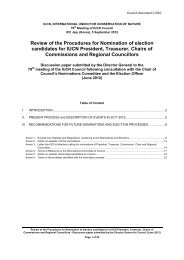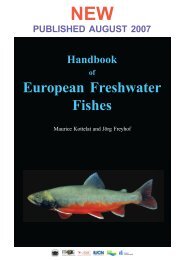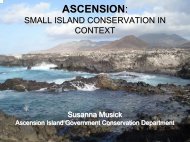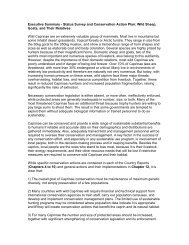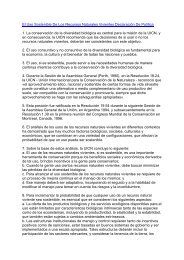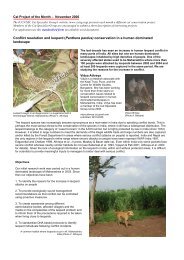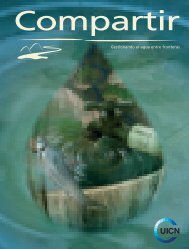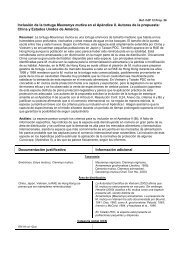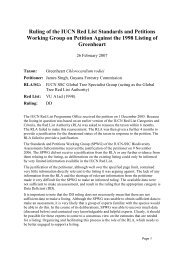Planning education to care for the earth - IUCN Knowledge Network
Planning education to care for the earth - IUCN Knowledge Network
Planning education to care for the earth - IUCN Knowledge Network
Create successful ePaper yourself
Turn your PDF publications into a flip-book with our unique Google optimized e-Paper software.
Influences on pro-environmental practicescountries. Environmental programmes may be marginalized in <strong>the</strong> processof curriculum re<strong>for</strong>m. Such developments tend <strong>to</strong> reduce <strong>the</strong> number ofwell qualified and caring environmental educa<strong>to</strong>rs and curriculumdevelopment staff.These trends have serious policy implications. The data ga<strong>the</strong>red in <strong>the</strong>Palmer project could have a crucial influence on <strong>the</strong> people responsible <strong>for</strong>school budget preparation and curriculum development programmes, byproviding <strong>the</strong> understanding that positive experiences in <strong>the</strong> environmentare vital <strong>to</strong> <strong>the</strong> development of concern <strong>for</strong> it.It seems appropriate in <strong>the</strong> light of <strong>the</strong> study <strong>to</strong> reconsider <strong>the</strong> content ofcourses <strong>for</strong> intending teachers at all levels (not only those concerned withadvanced examination work). All teacher trainees must be given not only<strong>the</strong> subject-matter knowledge of environmental issues but must alsounderstand <strong>the</strong> ways in which this may effectively be passed on <strong>to</strong> pupils ina classroom. In <strong>education</strong>al terms, knowledge of <strong>the</strong> pedagogic content isas important as knowledge of <strong>the</strong> subject itself.Finally, <strong>the</strong> importance of <strong>the</strong> sense of “ownership” has <strong>to</strong> be stressed.Many of <strong>the</strong> au<strong>to</strong>biographical accounts make this obvious. If young people- and indeed adults - feel that <strong>the</strong>y belong <strong>to</strong> a place or a project, andperceive <strong>the</strong> direct relevance of <strong>the</strong> environment <strong>to</strong> <strong>the</strong>ir own lives, <strong>the</strong>ngenuine <strong>care</strong>, concern and a desire <strong>to</strong> take positive action will result. Surely<strong>the</strong> development of such a sense should underlie <strong>the</strong> aims of programmes ofenvironmental <strong>education</strong>.Explana<strong>to</strong>ry note:The study described in this chapter is <strong>the</strong> first phase of an extendedinvestigation in<strong>to</strong> <strong>the</strong> development of peoples’ concern <strong>for</strong> <strong>the</strong> environmententitled: Emergent Environmentalism. This is an international study,currently funded by <strong>the</strong> Economic and Social Research Council in <strong>the</strong>United Kingdom (<strong>for</strong> work in England and <strong>the</strong> United States) and <strong>the</strong>British Council (in Slovenia). Data on <strong>the</strong> <strong>for</strong>mative experiences ofenvironmental educa<strong>to</strong>rs now being collected in <strong>the</strong> United States andCanada will significantly enlarge <strong>the</strong> research base.Ano<strong>the</strong>r aspect of <strong>the</strong> overall project (ongoing at <strong>the</strong> University ofDurham) involves a study of <strong>the</strong> environmental knowledge base of younglearners. In this phase we are considering what children know andunderstand about selected environmental issues as and when <strong>the</strong>y startschool and how that knowledge develops during <strong>the</strong> first two <strong>to</strong> three yearsof <strong>for</strong>mal <strong>education</strong>.The overall project will generate data with far-reaching implications <strong>for</strong> <strong>the</strong>design and development of EE programmes. These data will also serve as asound academic research base with relevance <strong>for</strong> all those engaged in <strong>the</strong>planning and implementation of policy at both national and localcommunity levels.7




